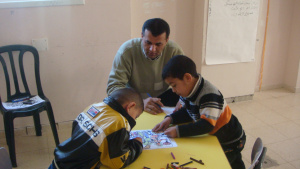The Many Victims of Domestic Violence
 Group #1 participants working with TYO Health Teacher Ahmad Hanani.
Group #1 participants working with TYO Health Teacher Ahmad Hanani.
As our Spring 2009 Session came to a close last week, the Core Program teachers began gathering feedback from the children’s parents. In one day, the team called forty-one families. It was exciting and empowering to hear from these parents how we helped their children and how we have contributed to positive social change within the Nablusi community.
After reading parent feedback from children in Group #1—the six years old group—I sensed that these children are exposed to physical abuse in their homes. In their classroom, these children display responses such as fear, anger, guilt, sadness, rejection that are common among those exposed to physical abuse. Domestic violence occurs in Nablus just as other places in the world. Culturally, however, speaking up is not acceptable and women rarely get the attention and services they need. My attention was drawn to this as I reflected upon the session that just passed. Most of the children in Group #1 preferred to stay with their mothers and displayed behaviors that masked separation anxiety when apart.
From my experience as a family counselor in the United States and in Palestine children, especially young boys, who experience or witnessing domestic violence, develop a desire to protect their mothers from such abuse. In short, domestic violence reserves the parent-child relationship instilling in the child a sense of responsibility for an adult’s life and in turn depriving the child of its childhood.
TYO offers a safe environment to these children—a place where they can foster healthy and positive relationships with adults. By serving as positive role models, our teachers and university volunteers guide these young children to effective ways of managing their anger, coping with the effects of violence, and finding alternative outlets for their aggression other than perpetuating the cycle of violence. In our classrooms, we provide children with basic tools to understand conflict and negative emotional responses by processing them in positive ways. In doing this, we expand their perception of the options before them and allow them to consider their agency and autonomy.
Increasing community awareness of domestic violence is not an easy task. It is even harder in a community like Nablus where adequate social services do not exist. However, TYO is breaking new ground within the community with early childhood intervention. Our programs allow children the opportunity to feel physically and emotionally safe and secure, provide supportive adult figures, important role models and work to realign each child’s development for a brighter future.
Group #1 serves an important reminder of the necessity and challenges inherent in our work. In doing so, it propels my commitment and enthusiasm for our work. Thus as we spend this week evaluating the previous session, I find myself continually asking the team how were can go even further to provide these children with the support, tools and resources they need.
